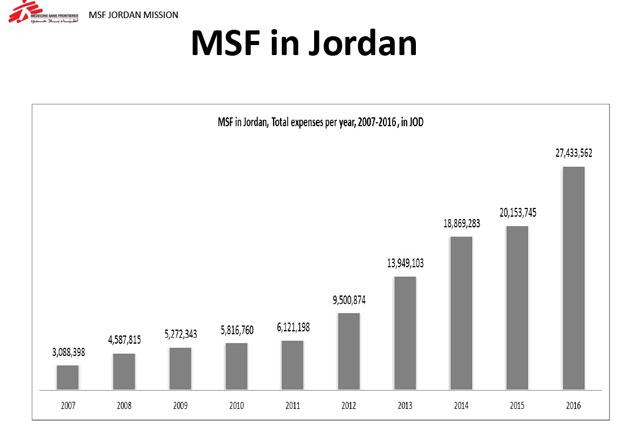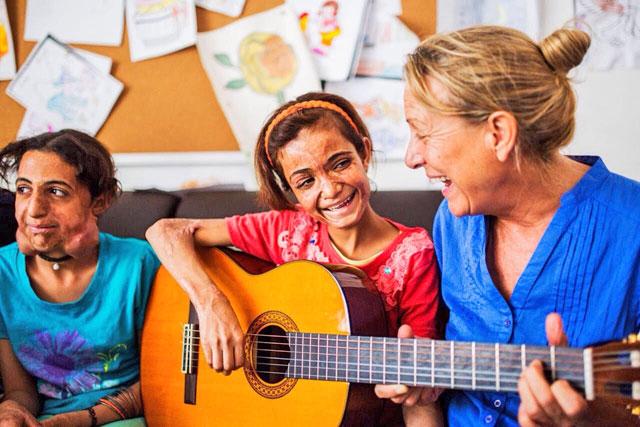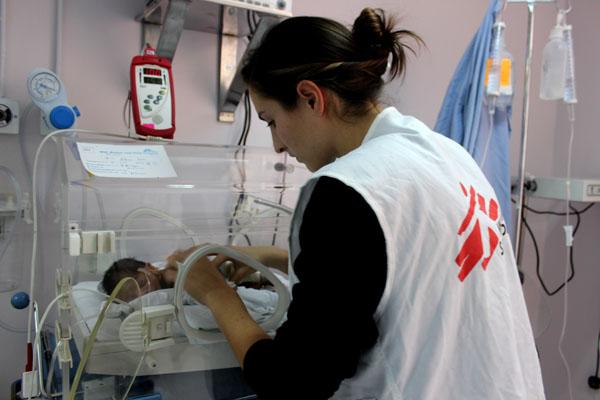You are here
MSF in Amman treating casualties of region’s wars
By Rana Husseini - Jan 16,2017 - Last updated at Jan 16,2017

AMMAN — Two years ago, five-year-old Noor stepped on a landmine in a street in the Iraqi city of Fallujah.
For the last three months, she has been receiving treatment at the Médecins Sans Frontières/Doctors without Borders (MSF) Hospital for Reconstructive Surgery (HRS) in Amman.
The child has undergone several operations to remove burnt skin, mostly from her face and head, with tissue expansion and then flaps, a process similar to a skin graft, according to physicians at the hospital.
Two rooms away lay 30-year-old Awatef from Homs in Syria, who was suffering from severe burns and injuries to her face and head.
“I was sitting at home when a plane dropped a bomb. I have been suffering for four years and was admitted to the hospital six months ago,” Awatef told The Jordan Times.
“My condition has improved considerably because of the professional treatment and handling of my case by the physicians at the hospital,” added Awatef with a smile.
Both Noor and Awatef are among dozens of war-injured individuals who learnt about the hospital from organisations in their countries and are currently being treated at the HRS, run by MSF.
The HRS was officially opened in August 2015, though it started receiving cases even before that date.
Head of the MSF Mission in Jordan, Marc Schakal, who received members from the government’s coordination team for human rights on Monday, said “HRS is one of the MSF’s most important investments in the Middle East".
“Our investment in Jordan is over JD27 million annually… employing over 600 [people], including 183 at the hospital, who are mostly Jordanians,” Schakal told the delegation and the press during the two-hour meeting and tour of the facility.
“More importantly, our funding is from private sectors, which allows us to be transparent and independent [and] to manage our operations without any interferences,” he said.
The MSF chief of mission added that the organisation aims to expand cooperation with the government on a long-term basis.
“We are ready to commit to long-term work and are hopeful that the Jordanian government will be willing to support our work,” Schakal added.
Also addressing the gathering was MSF Head of Mission of the Syrian Crisis in Jordan Erwan Grillon.
“We try to focus on chronic diseases among refugees, but the number is big and we will be extending our services in certain areas such as Mafraq,” Grillon said.
Another aim is to organise “flash visits to the Syrian side to evaluate the current situation and know what is happening there,” the MSF official added.
Meanwhile, Basil Tarawneh, the government’s coordinator on human rights, praised MSF’s work to help victims of war and Syrian refugees.
“You are doing an important job here in providing medical aid for people residing in Jordan, as well as the refugees,” Tarawneh told MSF officials and staff.
He added that the presence of members of the government’s coordination team is part of the cooperation and communication with various international organisations providing humanitarian aid in the Kingdom.
The MSF hospital is part of the organisation’s mission in Jordan to provide war wounded patients from Syria, Yemen, Iraq and Palestine with maxillofacial, plastic and orthopaedic surgeries.
In 2016, according to Schakal, there were 537 admissions and 1,000 surgeries carried out.
The eight-storey hospital has a capacity of 50-60 patients daily, with two of its floors allocated for surgical work and advanced isolation measures for infection control.
During their average 150-day stay at the hospital, patients of all ages are provided with psychosocial support, in addition to entertainment activities for children, who constitute up to 20 per cent of the patients.
The previous MSF facility used to be on a single floor of the Red Crescent Hospital in east Amman, while the new one occupies the entire building of the former Mowasat Hospital in the capital’s Marka neighbourhood.
The France-based non-profit medical and humanitarian organisation provides free medical care to communities affected by natural disasters, armed conflicts and disease outbreaks.
A recipient of the Nobel Peace Prize in 1999 and the King Hussein Foundation Humanitarian Leadership Prize in 2004, MSF provides services through 19 offices and has its international headquarters in Geneva.
Related Articles
AMMAN — Prime Minister Abdullah Ensour on Tuesday received Médecins Sans Frontières (MSF) International President Joanne Liu and discussed t
AMMAN — Médecins Sans Frontières/Doctors without Borders (MSF) is launching a photo exhibition on Tuesday that aims to share the organ
Médecins Sans Frontières (MSF) in Amman seeks to upgrade its medical services for war-wounded patients in the region in a new setup that will be launched soon, according to Marc Schakal, MSF head of mission in Jordan and Iraq.


















